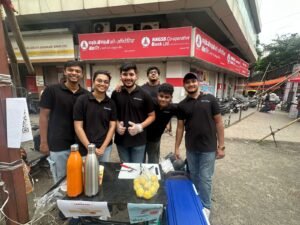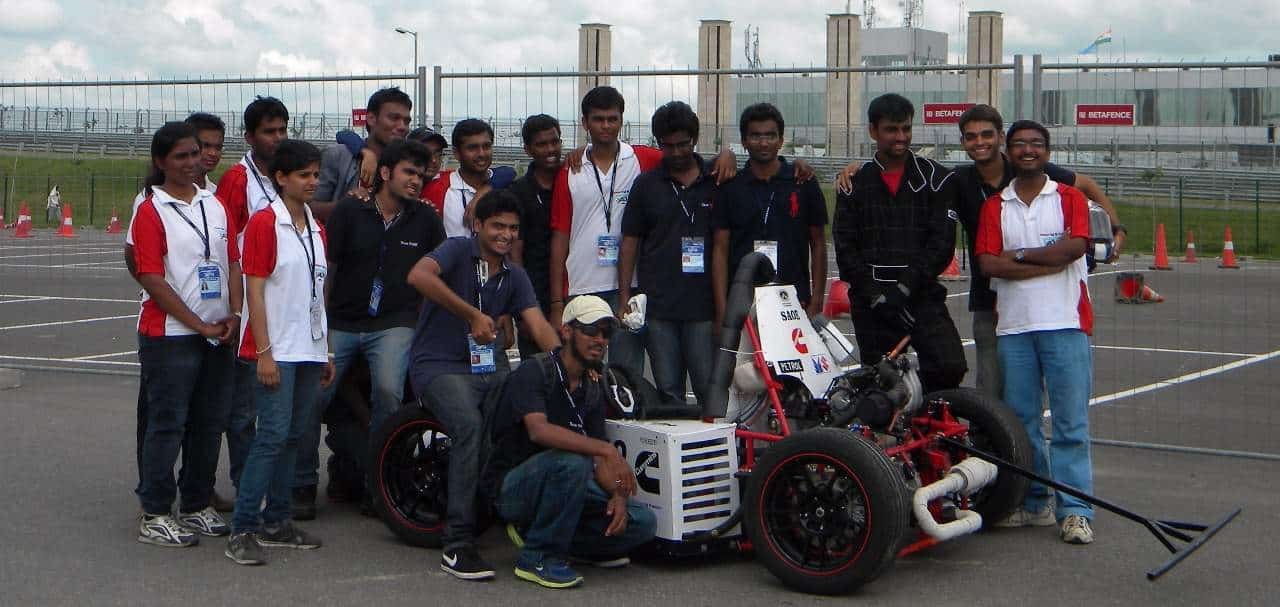
In the Middle of My Own Storm
Here’s a question for you: Do you know the Joker who juggles 3 balls in his hands? Have…
July 16, 2018
[dropcaps type=’square’ font_size=’80’ color=’#4a4a4a’ background_color=’#ffffff’ border_color=”]B[/dropcaps]AJA SAE India is a name synonymous with undying passion, hard-work, sleepless nights, mud, muck and grease. If you haven’t heard about it, it is the annual engineering design competition that challenges engineering students from across India to design, build, manufacture and race their very own All Terrain Vehicle. To do well at ‘BAJA’ as it is popularly known has been the dream of thousands of students since its inception in 2007.
Doing well at BAJA for an engineering student equals having companies line up for them during college placement. My teammates had job offers from three different companies on the basis of BAJA. Even today, as they are growing and progressing in their varied organisations, the single most important event that has helped them develop themselves and develop a thinking process that is confident of solving even the most critical of situations has been BAJA.
So what makes BAJA so special? What is it that attracts employers to students who have tasted mud at BAJA? Why do students invest their time outside the comfort of classroom learning? And how do the BAJA members have this deep sense of self-belief?
Let me dissect that through three distinct characteristics unique to BAJA –

BAJA isn’t a club, committee, contest or a fest. You can’t put x number of hours at BAJA and gain experience. BAJA is a student-run ‘enterprise’. Right from funding, to designing, to fabricating, to auditing, to branding and even logistics, everything is executed and managed by a team that is led and managed by a core group of students.
Which means it is a full-blown business that’s innovating, designing and solving a problem. And ofcourse, selling it too. To be a part of this enterprise, you have to give much more than just your time.
[blockquote text=”BAJA means real money, real hard work, real risk and real victory!” text_color=”” width=”” line_height=”undefined” background_color=”” border_color=”” show_quote_icon=”yes” quote_icon_color=”#4285F4″]
We were only 20 odd when we were selling our spirits to raise funds from big corporates, designing vehicles that could withstand torturous terrains, fabricating and building complex mechanisms with our own hands, handling logistics and the men involved with it, branding our car and even auditing our own accounts.
This enabled us as students to innovate, fail, test, learn, adapt, triumph and achieve success as a group of students. There is simply no better learning process than taking on responsibility and owning a job to get it done.

An incident I remember very closely was the time when we realised we had made a rulebook error in the engine bay of the rollcage of the vehicle. It was 1 am and we were depressed and angry. We were in denial and were in no way prepared to cut and redo the rollcage. We debated and at about 3 am we realised we had no option but to cut and redo the engine bay. This was a huge task, but only because of the team we had, we were able to get teams of 2 doing three different tasks such that we had a new engine bay up by 3 am the next night. In spite of college being on, suppliers being in different areas of the city and the team alternating shifts, we completed the task. That 24-hour circle was one of the most satisfying I had ever taken on my life clock. We had borne failure, stress and difficulty as a team and transformed it into a lifetime story of victory for ourselves.

The second most important thing that the team learns is to self-learn.
Everything that a BAJA team member has to do stems around learning fast. They have to learn how to sell their spirit to gain sponsorship, learn engineering principles, learn man management, learn delegation of work, learn how to reverse engineer their seniors’ mistakes and improve upon them and much much more. More importantly, through this, they develop an attitude of never taking no as an answer. In fact, the self-learning process is so strong during BAJA, that engineering principles not learnt through a semester of learning, happen through a practical experience of less than a day. What is also interesting is that this self-learning process helps them develop the confidence of taking on any job and owning it. This is what employers and successful businesses yearn for.

The third most important thing that a BAJA student learns is the ability to work in a team. Since BAJA is an intense activity of almost 9-10 months, every team member has to go through the rigours of working in a team. A BAJA team typically has a leadership group of fourth years, then a mix of third years and second years.
There are different departments such as design, fabrication, finance, sponsorship, race technicians and much more. Each student is involved in every activity or a leadership position in some way or the other. This experience of working in a team helps them and makes them ready for their professional life. It helps them understand the dynamics of a team leader and the responsibility of a team member. Like every organisation, the passengers of the team are the people who in spite of being part of the team, are not able to progress as much as the movers and shakers of the team.
As a team, you see dreams of being the best in the country. You see those dreams come true or you see them crash. At the time, you will not realise it, but the skills learnt during this journey of 9-10 months is exponentially more important than whatever the end result might be. It really does set you up for life!

The success of any BAJA team heavily depends upon the knowledge transfer from the earlier team. If there’s no knowledge transfer and no mentorship, years of work can disappear in no time. At the same time, a good team can become exceptional if their seniors mentor them correctly and guide them and help them avoid the mistakes they have made. Arguably, BAJA’s most successful team – TEAM NEMESIS from College of Engineering, Pune have mastered this. Their mentorship and knowledge transfer is the best in the country. It comes as no surprise then that they are the best BAJA team in the country consistently for the last six years!
[action full_width=’No’ content_in_grid=’yes’ type=’simple’ icon=” icon_size=” icon_color=” custom_icon=” background_color=’#ffffff’ border_color=’#4285F4′ show_button=’no’ button_text=” button_link=” button_target=” button_text_color=” button_hover_text_color=” button_background_color=” button_hover_background_color=” button_border_color=” button_hover_border_color=”]
A 2016 report pegged employability of fresh engineering graduates between 4% and 7%. Student-run enterprises and clubs are one of the only ways India will be able to sustain its engineers. During BAJA, many of us figured out what we were good at just because we had the chance to explore a variety of careers.
[/action]
[blockquote text=”Running an enterprise during my college is one of the smartest decisions I have taken in my career.” text_color=”” width=”” line_height=”undefined” background_color=”” border_color=”” show_quote_icon=”yes” quote_icon_color=”#4285F4″]
Friends and I who were a part of BAJA, were ready in the eyes of the employers to handle the pressures of the real world and click fast with the changing work environment.
Our employers could see that the engineering students passing out with a year-long experience with BAJA could sell ideas, practically apply otherwise mundane engineering principles, manage people, delegate work, break big tasks into small ones and lead a team.
[highlight color=” background_color=’#949494′] Today, this attitude and the skills listed above are the so-called 21st century skills that are essential for one to do well in his or her career no matter which career or profession you may choose! [/highlight]
On a closing note, the student-run nature, the self-learning process and working in a team taught me much more than any classroom did during the four years of my engineering at Sinhgad Academy of Engineering. We had an amazing environment of learning backed by our Head of Department who was a huge patron of BAJA. This led to us creating a brand of vehicles at BAJA that is revered till today.

Click here to watch the TV show on Team Vamos led by Yusuf in BAJA SAE INDIA 2012


Let's Enterprise is a pioneering educational institution that empowers students with hands-on business skills through its unique UG-M.E.D. program. With campuses in Pune and Goa, it bridges the gap between traditional learning and real-world experience, shaping the future of tomorrow's entrepreneurs.
Discover how our first-year students are actively engaging in real-world business projects, guided by facilitator Sharjeel Shaikh.